外研版(2019)必修第二册Unit 4 Stage and Screen Understanding ideas 课件(共46张PPT)
文档属性
| 名称 | 外研版(2019)必修第二册Unit 4 Stage and Screen Understanding ideas 课件(共46张PPT) |  | |
| 格式 | pptx | ||
| 文件大小 | 39.1MB | ||
| 资源类型 | 教案 | ||
| 版本资源 | 外研版(2019) | ||
| 科目 | 英语 | ||
| 更新时间 | 2024-04-14 22:09:24 | ||
图片预览

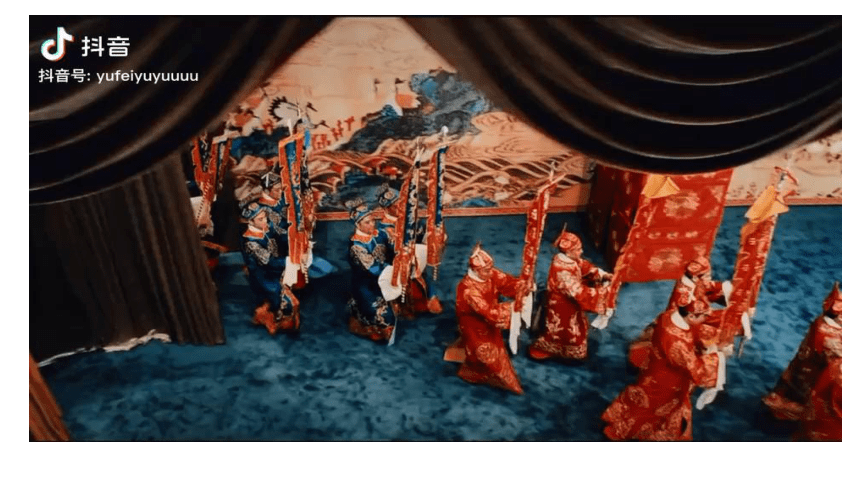
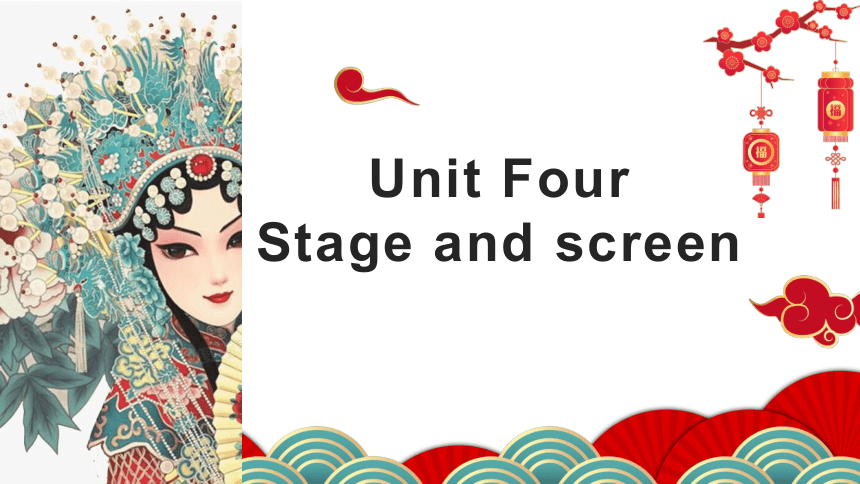

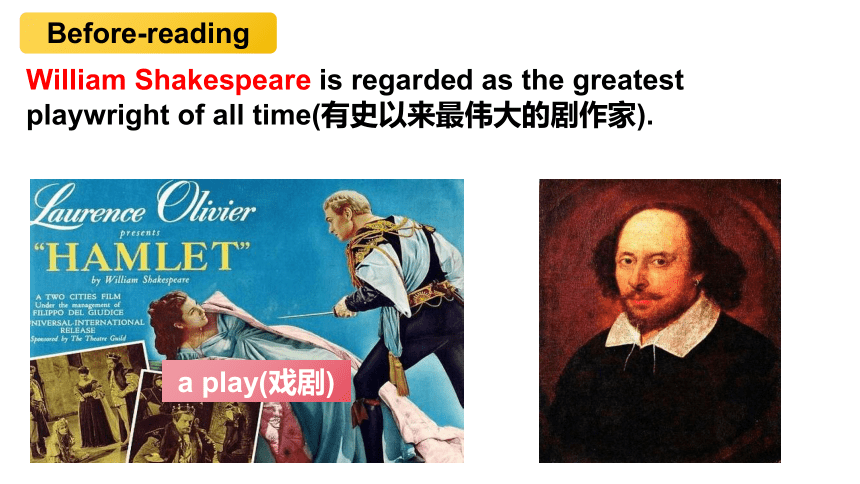
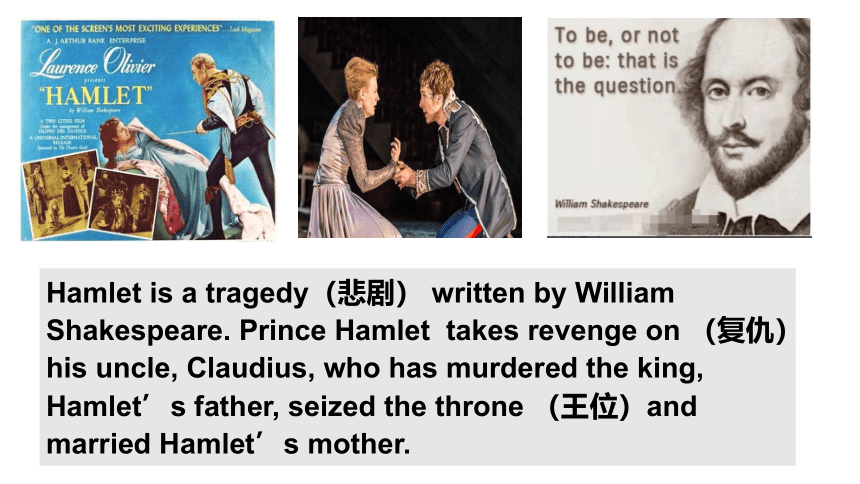
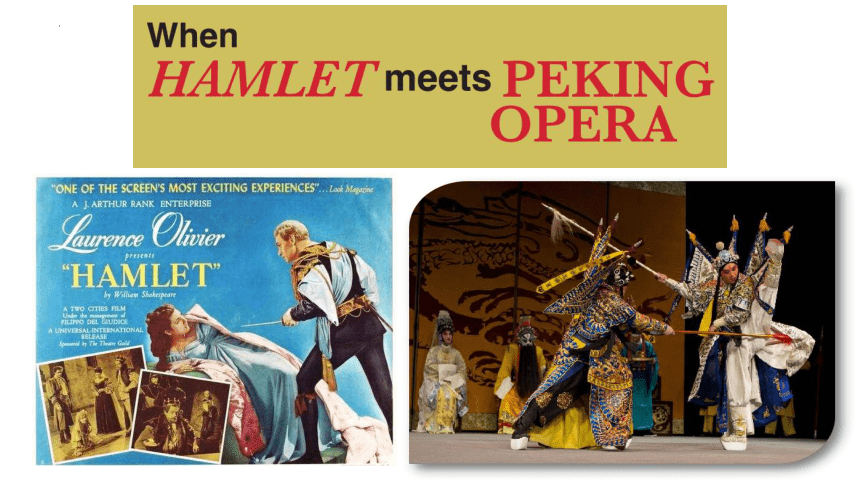
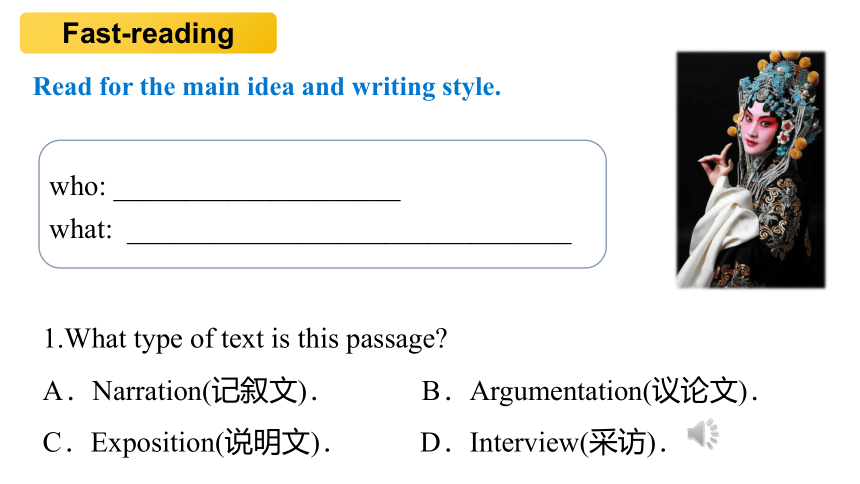
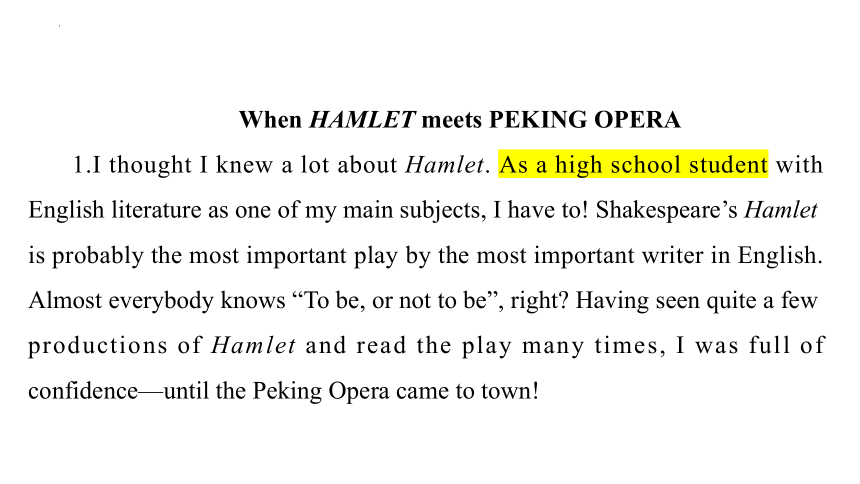
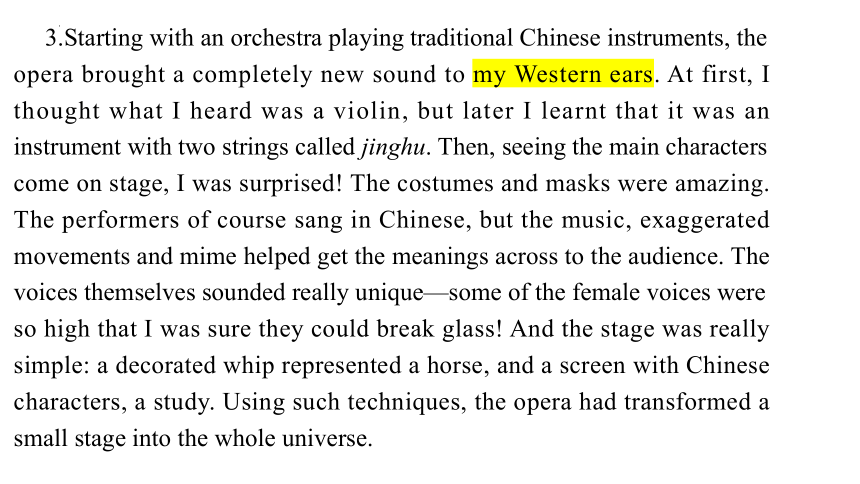
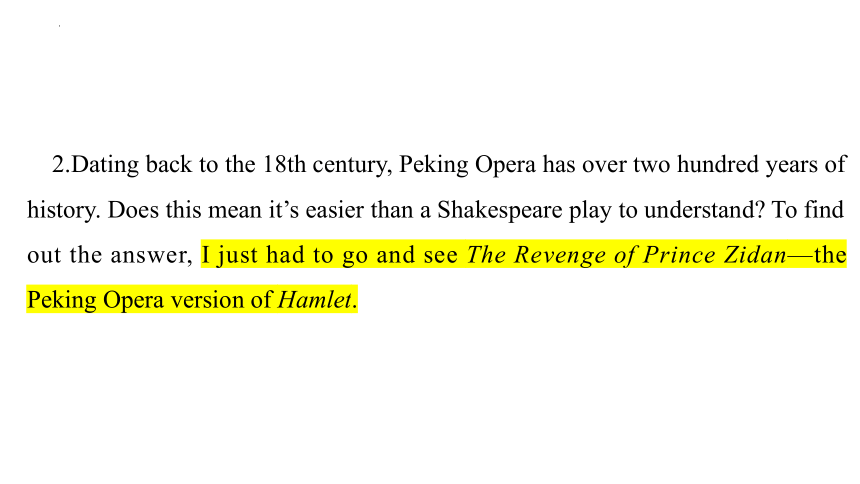
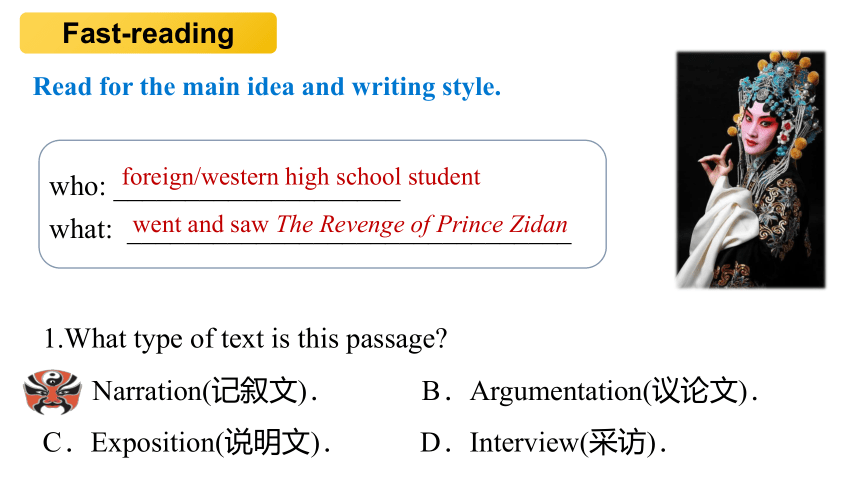
文档简介
(共46张PPT)
Unit Four
Stage and screen
Learning aims
Get the main idea of this passage
Prace reading skills
Experience cultural diversity
01
02
03
a play(戏剧)
William Shakespeare is regarded as the greatest playwright of all time(有史以来最伟大的剧作家).
Before-reading
Hamlet is a tragedy(悲剧) written by William Shakespeare. Prince Hamlet takes revenge on (复仇)his uncle, Claudius, who has murdered the king, Hamlet’s father, seized the throne (王位)and married Hamlet’s mother.
1.What type of text is this passage
A.Narration(记叙文). B.Argumentation(议论文).
C.Exposition(说明文). D.Interview(采访).
who: ____________________
what: _______________________________
Read for the main idea and writing style.
Fast-reading
When HAMLET meets PEKING OPERA
1.I thought I knew a lot about Hamlet. As a high school student with English literature as one of my main subjects, I have to! Shakespeare’s Hamlet is probably the most important play by the most important writer in English. Almost everybody knows “To be, or not to be”, right Having seen quite a few productions of Hamlet and read the play many times, I was full of confidence—until the Peking Opera came to town!
3.Starting with an orchestra playing traditional Chinese instruments, the opera brought a completely new sound to my Western ears. At first, I thought what I heard was a violin, but later I learnt that it was an instrument with two strings called jinghu. Then, seeing the main characters come on stage, I was surprised! The costumes and masks were amazing. The performers of course sang in Chinese, but the music, exaggerated movements and mime helped get the meanings across to the audience. The voices themselves sounded really unique—some of the female voices were so high that I was sure they could break glass! And the stage was really simple: a decorated whip represented a horse, and a screen with Chinese characters, a study. Using such techniques, the opera had transformed a small stage into the whole universe.
2.Dating back to the 18th century, Peking Opera has over two hundred years of history. Does this mean it’s easier than a Shakespeare play to understand To find out the answer, I just had to go and see The Revenge of Prince Zidan—the Peking Opera version of Hamlet.
1.What type of text is this passage
A.Narration(记叙文). B.Argumentation(议论文).
C.Exposition(说明文). D.Interview(采访).
who: ____________________
what: _______________________________
foreign/western high school student
went and saw The Revenge of Prince Zidan
Read for the main idea and writing style.
Fast-reading
2.Choose the author's purpose in writing the passage.
A. To prove that Peking Opera is a better way to perform Hamlet.
B. To inform告知 the readers how to perform Hamlet through Peking Opera.
C. To share the unique experience of seeing a Peking Opera version of Hamlet.
D. To make a comparison对比 between Eastern and Western cultures.
Fast reading
Before the performance
(Part 1:_________)
During the performance
(Part 2:_________)
After the performance
(Part 1:______)
4. The author writes this passage by ______
A. space order B. time order
C. logic order D. cause and effect
3. Complete the structure of the passage.
When HAMLET meets PEKING OPERA
1.I thought I knew a lot about Hamlet. As a high school student with English literature as one of my main subjects, I have to! Shakespeare’s Hamlet is probably the most important play by the most important writer in English. Almost everybody knows “To be, or not to be”, right Having seen quite a few productions of Hamlet and read the play many times, I was full of confidence—until the Peking Opera came to town!
2.Dating back to the 18th century, Peking Opera has over two hundred years of history. Does this mean it’s easier than a Shakespeare play to understand To find out the answer, I just had to go and see The Revenge of Prince Zidan—the Peking Opera version of Hamlet.
3.Starting with an orchestra playing traditional Chinese instruments, the opera brought a completely new sound to my Western ears. At first, I thought what I heard was a violin, but later I learnt that it was an instrument with two strings called jinghu. Then, seeing the main characters come on stage, I was surprised! The costumes and masks were amazing. The performers of course sang in Chinese, but the music, exaggerated movements and mime helped get the meanings across to the audience. The voices themselves sounded really unique—some of the female voices were so high that I was sure they could break glass! And the stage was really simple: a decorated whip represented a horse, and a screen with Chinese characters, a study. Using such techniques, the opera had transformed a small stage into the whole universe.
4.Easily my favourite part of the show was how the characters moved on stage. I had never seen Prince Hamlet do a backflip before! That was simply incredible. It was so dazzling and energetic that I wasn’t sure if the characters were performers or athletes! Everyone was clapping.
5.Before experiencing The Revenge of Prince Zidan, I wasn’t sure if I would enjoy it. But, in fact, I was on the edge of my seat! Feeling the strong emotions of love, anger, fear and grief in the performance, I could easily recognise the theme of Hamlet. So, if you want to see a show that combines music, singing, drama, poetry and costume design with explosive effect, The Revenge of Prince Zidan ticks all the right boxes!
Before the performance
(Part 1:_________)
Paras.1-2
During the performance
(Part 2:_________)
Paras.3-4
After the performance
(Part 1:______)
Para.5
4. The author writes this passage by ______
A. space order B. time order
C. logic order D. cause and effect
3. Complete the structure of the passage.
1. Why did the author go to see The Revenge of Prince Zidan
A. To confirm确定,证明 that Peking Opera is easier to understand.
B. To make sure it has a long story.
C. To enjoy the Peking Opera version of Hamlet.
D. To find out弄清 the differences between Hamlet and its Peking Opera version.
Careful reading
Read for details
2.Dating back to the 18th century, Peking Opera has over two hundred years of history. Does this mean it’s easier than a Shakespeare play to understand To find out the answer, I just had to go and see The Revenge of Prince Zidan—the Peking Opera version of Hamlet.
1. Why did the author go to see The Revenge of Prince Zidan
A. To confirm确定,证明 that Peking Opera is easier to understand.
B. To make sure it has a long story.
C. To enjoy the Peking Opera version of Hamlet.
D. To find out弄清 the differences between Hamlet and its Peking Opera version.
Careful reading
Read for details
2. What helped get the meanings across to the audience
A. The main characters.
B. The costumes and masks.
C.The music,exaggerated movements and mime.
D.The voices of the performers.
3.Starting with an orchestra playing traditional Chinese instruments, the opera brought a completely new sound to my Western ears. At first, I thought what I heard was a violin, but later I learnt that it was an instrument with two strings called jinghu. Then, seeing the main characters come on stage, I was surprised! The costumes and masks were amazing. The performers of course sang in Chinese, but the music, exaggerated movements and mime helped get the meanings across to the audience. The voices themselves sounded really unique—some of the female voices were so high that I was sure they could break glass! And the stage was really simple: a decorated whip represented a horse, and a screen with Chinese characters, a study. Using such techniques, the opera had transformed a small stage into the whole universe.
2. What helped get the meanings across to the audience
A. The main characters.
B. The costumes and masks.
C.The music,exaggerated movements and mime.
D.The voices of the performers.
3. Which one is not true
A. ”To be, or not to be"is from Hamlet.
B. Peking Opera started in the 18th century.
C. It was for the first time that the author saw Hamlet do a backflip.
D.Both the violin and jinghu were played in the performance.
When HAMLET meets PEKING OPERA
1.I thought I knew a lot about Hamlet. As a high school student with English literature as one of my main subjects, I have to! Shakespeare’s Hamlet is probably the most important play by the most important writer in English. Almost everybody knows “To be, or not to be”, right Having seen quite a few productions of Hamlet and read the play many times, I was full of confidence—until the Peking Opera came to town!
2.Dating back to the 18th century, Peking Opera has over two hundred years of history. Does this mean it’s easier than a Shakespeare play to understand To find out the answer, I just had to go and see The Revenge of Prince Zidan—the Peking Opera version of Hamlet.
4.Easily my favourite part of the show was how the characters moved on stage. I had never seen Prince Hamlet do a backflip before! That was simply incredible. It was so dazzling and energetic that I wasn’t sure if the characters were performers or athletes! Everyone was clapping.
3.Starting with an orchestra playing traditional Chinese instruments, the opera brought a completely new sound to my Western ears. At first, I thought what I heard was a violin, but later I learnt that it was an instrument with two strings called jinghu. Then, seeing the main characters come on stage, I was surprised! The costumes and masks were amazing. The performers of course sang in Chinese, but the music, exaggerated movements and mime helped get the meanings across to the audience. The voices themselves sounded really unique—some of the female voices were so high that I was sure they could break glass! And the stage was really simple: a decorated whip represented a horse, and a screen with Chinese characters, a study. Using such techniques, the opera had transformed a small stage into the whole universe.
3. Which one is not true
A. ”To be, or not to be"is from Hamlet.
B. Peking Opera started in the 18th century.
C. Both the violin and jinghu were played in the performance.
D.It was for the first time that the author saw Hamlet do a backflip.
4. What was the author’s favourite part of the show
A. The orchestra plays traditional Chinese instruments.
B. How the characters moved on stage.
C. The costumes and masks.
D.The voices of the performers.
4.Easily my favourite part of the show was how the characters moved on stage. I had never seen Prince Hamlet do a backflip before! That was simply incredible. It was so dazzling and energetic that I wasn’t sure if the characters were performers or athletes! Everyone was clapping.
4. What was the author’s favourite part of the show
A. The orchestra plays traditional Chinese instruments.
B. How the characters moved on stage.
C. The costumes and masks.
D.The voices of the performers.
5. How could the author easily recognise the theme of Hamlet
A. The experience of watching The Revenge of Prince Zidan.
B. The performers’ excellent performance.
C. He knew a lot about Hamlet.
D. Feeling the strong emotions of love,anger,fear and grief in the performance.
5.Before experiencing The Revenge of Prince Zidan, I wasn’t sure if I would enjoy it. But, in fact, I was on the edge of my seat! Feeling the strong emotions of love, anger, fear and grief in the performance, I could easily recognise the theme of Hamlet. So, if you want to see a show that combines music, singing, drama, poetry and costume design with explosive effect, The Revenge of Prince Zidan ticks all the right boxes!
5. How could the author easily recognise the theme of Hamlet
A. The experience of watching The Revenge of Prince Zidan.
B. The performers’ excellent performance.
C. He knew a lot about Hamlet.
D. Feeling the strong emotions of love,anger,fear and grief in the performance.
6. What’s the meaning of "The Revengeof Prince Zidan ticks all the right boxes"
A. The play is difficult to understand.
B. The play is an excellent choice.
C. The play is full of boxes.
D. The play is not right for you.
5.Before experiencing The Revenge of Prince Zidan, I wasn’t sure if I would enjoy it. But, in fact, I was on the edge of my seat! Feeling the strong emotions of love, anger, fear and grief in the performance, I could easily recognise the theme of Hamlet. So, if you want to see a show that combines music, singing, drama, poetry and costume design with explosive effect, The Revenge of Prince Zidan ticks all the right boxes!
6. What’s the meaning of "The Revengeof Prince Zidan ticks all the right boxes"
A. The play is difficult to understand.
B. The play is an excellent choice.
C. The play is full of boxes.
D. The play is not right for you.
As teenagers, we are expected to respect尊重 cultural diversity(文化多样性), be full of confidence信心 in Chinese traditional culture, and spread Chinese traditional culture to the whole world.
Think and share
How could we carry forward弘扬 Peking Opera and our other traditional cultures
Regard English as a tool to spread Chinese culture;
Enrich(丰富) our knolwedge of Chinese culture;
Improve ourselves and work harder to build a strong China!
Develop a strong sense of national pride(民族自豪感) and cultural confidence(文化自信);
The Revenge of Prince Zidan
Before the
performance
·He thought ________________________.
·He wondered if Peking Opera is easier than a Shakespeare play to understand.
_____ _____ were amazing
The voices_______
The stage________
The movements of the characters were______________________________
·He felt __________________________ __________________________________.
_______
curious
During the
performance
After the
performance
Feelings
Reasons
Read the passage carefully and complete the chart.
Homework p53
_______
_______
impressed
The Revenge of Prince Zidan
Before the
performance
·He thought ________________________.
·He wondered if Peking Opera is easier than a Shakespeare play to understand.
_____ _____ were amazing
The voices_______
The stage________
The movements of the characters were______________________________
·He felt __________________________ __________________________________.
he knew a lot about Hamlet
surprised
sounder really unique
was really simple
the strong emotions of love, anger,
fear and grief in the performance
_______
curious
The costumes and masks
confident
exaggerated, incredible, dazzling and energetic
During the
performance
After the
performance
Feelings
Reasons
Read the passage carefully and complete the chart.
Homework p53
_______
_______
impressed
Unit Four
Stage and screen
Learning aims
Get the main idea of this passage
Prace reading skills
Experience cultural diversity
01
02
03
a play(戏剧)
William Shakespeare is regarded as the greatest playwright of all time(有史以来最伟大的剧作家).
Before-reading
Hamlet is a tragedy(悲剧) written by William Shakespeare. Prince Hamlet takes revenge on (复仇)his uncle, Claudius, who has murdered the king, Hamlet’s father, seized the throne (王位)and married Hamlet’s mother.
1.What type of text is this passage
A.Narration(记叙文). B.Argumentation(议论文).
C.Exposition(说明文). D.Interview(采访).
who: ____________________
what: _______________________________
Read for the main idea and writing style.
Fast-reading
When HAMLET meets PEKING OPERA
1.I thought I knew a lot about Hamlet. As a high school student with English literature as one of my main subjects, I have to! Shakespeare’s Hamlet is probably the most important play by the most important writer in English. Almost everybody knows “To be, or not to be”, right Having seen quite a few productions of Hamlet and read the play many times, I was full of confidence—until the Peking Opera came to town!
3.Starting with an orchestra playing traditional Chinese instruments, the opera brought a completely new sound to my Western ears. At first, I thought what I heard was a violin, but later I learnt that it was an instrument with two strings called jinghu. Then, seeing the main characters come on stage, I was surprised! The costumes and masks were amazing. The performers of course sang in Chinese, but the music, exaggerated movements and mime helped get the meanings across to the audience. The voices themselves sounded really unique—some of the female voices were so high that I was sure they could break glass! And the stage was really simple: a decorated whip represented a horse, and a screen with Chinese characters, a study. Using such techniques, the opera had transformed a small stage into the whole universe.
2.Dating back to the 18th century, Peking Opera has over two hundred years of history. Does this mean it’s easier than a Shakespeare play to understand To find out the answer, I just had to go and see The Revenge of Prince Zidan—the Peking Opera version of Hamlet.
1.What type of text is this passage
A.Narration(记叙文). B.Argumentation(议论文).
C.Exposition(说明文). D.Interview(采访).
who: ____________________
what: _______________________________
foreign/western high school student
went and saw The Revenge of Prince Zidan
Read for the main idea and writing style.
Fast-reading
2.Choose the author's purpose in writing the passage.
A. To prove that Peking Opera is a better way to perform Hamlet.
B. To inform告知 the readers how to perform Hamlet through Peking Opera.
C. To share the unique experience of seeing a Peking Opera version of Hamlet.
D. To make a comparison对比 between Eastern and Western cultures.
Fast reading
Before the performance
(Part 1:_________)
During the performance
(Part 2:_________)
After the performance
(Part 1:______)
4. The author writes this passage by ______
A. space order B. time order
C. logic order D. cause and effect
3. Complete the structure of the passage.
When HAMLET meets PEKING OPERA
1.I thought I knew a lot about Hamlet. As a high school student with English literature as one of my main subjects, I have to! Shakespeare’s Hamlet is probably the most important play by the most important writer in English. Almost everybody knows “To be, or not to be”, right Having seen quite a few productions of Hamlet and read the play many times, I was full of confidence—until the Peking Opera came to town!
2.Dating back to the 18th century, Peking Opera has over two hundred years of history. Does this mean it’s easier than a Shakespeare play to understand To find out the answer, I just had to go and see The Revenge of Prince Zidan—the Peking Opera version of Hamlet.
3.Starting with an orchestra playing traditional Chinese instruments, the opera brought a completely new sound to my Western ears. At first, I thought what I heard was a violin, but later I learnt that it was an instrument with two strings called jinghu. Then, seeing the main characters come on stage, I was surprised! The costumes and masks were amazing. The performers of course sang in Chinese, but the music, exaggerated movements and mime helped get the meanings across to the audience. The voices themselves sounded really unique—some of the female voices were so high that I was sure they could break glass! And the stage was really simple: a decorated whip represented a horse, and a screen with Chinese characters, a study. Using such techniques, the opera had transformed a small stage into the whole universe.
4.Easily my favourite part of the show was how the characters moved on stage. I had never seen Prince Hamlet do a backflip before! That was simply incredible. It was so dazzling and energetic that I wasn’t sure if the characters were performers or athletes! Everyone was clapping.
5.Before experiencing The Revenge of Prince Zidan, I wasn’t sure if I would enjoy it. But, in fact, I was on the edge of my seat! Feeling the strong emotions of love, anger, fear and grief in the performance, I could easily recognise the theme of Hamlet. So, if you want to see a show that combines music, singing, drama, poetry and costume design with explosive effect, The Revenge of Prince Zidan ticks all the right boxes!
Before the performance
(Part 1:_________)
Paras.1-2
During the performance
(Part 2:_________)
Paras.3-4
After the performance
(Part 1:______)
Para.5
4. The author writes this passage by ______
A. space order B. time order
C. logic order D. cause and effect
3. Complete the structure of the passage.
1. Why did the author go to see The Revenge of Prince Zidan
A. To confirm确定,证明 that Peking Opera is easier to understand.
B. To make sure it has a long story.
C. To enjoy the Peking Opera version of Hamlet.
D. To find out弄清 the differences between Hamlet and its Peking Opera version.
Careful reading
Read for details
2.Dating back to the 18th century, Peking Opera has over two hundred years of history. Does this mean it’s easier than a Shakespeare play to understand To find out the answer, I just had to go and see The Revenge of Prince Zidan—the Peking Opera version of Hamlet.
1. Why did the author go to see The Revenge of Prince Zidan
A. To confirm确定,证明 that Peking Opera is easier to understand.
B. To make sure it has a long story.
C. To enjoy the Peking Opera version of Hamlet.
D. To find out弄清 the differences between Hamlet and its Peking Opera version.
Careful reading
Read for details
2. What helped get the meanings across to the audience
A. The main characters.
B. The costumes and masks.
C.The music,exaggerated movements and mime.
D.The voices of the performers.
3.Starting with an orchestra playing traditional Chinese instruments, the opera brought a completely new sound to my Western ears. At first, I thought what I heard was a violin, but later I learnt that it was an instrument with two strings called jinghu. Then, seeing the main characters come on stage, I was surprised! The costumes and masks were amazing. The performers of course sang in Chinese, but the music, exaggerated movements and mime helped get the meanings across to the audience. The voices themselves sounded really unique—some of the female voices were so high that I was sure they could break glass! And the stage was really simple: a decorated whip represented a horse, and a screen with Chinese characters, a study. Using such techniques, the opera had transformed a small stage into the whole universe.
2. What helped get the meanings across to the audience
A. The main characters.
B. The costumes and masks.
C.The music,exaggerated movements and mime.
D.The voices of the performers.
3. Which one is not true
A. ”To be, or not to be"is from Hamlet.
B. Peking Opera started in the 18th century.
C. It was for the first time that the author saw Hamlet do a backflip.
D.Both the violin and jinghu were played in the performance.
When HAMLET meets PEKING OPERA
1.I thought I knew a lot about Hamlet. As a high school student with English literature as one of my main subjects, I have to! Shakespeare’s Hamlet is probably the most important play by the most important writer in English. Almost everybody knows “To be, or not to be”, right Having seen quite a few productions of Hamlet and read the play many times, I was full of confidence—until the Peking Opera came to town!
2.Dating back to the 18th century, Peking Opera has over two hundred years of history. Does this mean it’s easier than a Shakespeare play to understand To find out the answer, I just had to go and see The Revenge of Prince Zidan—the Peking Opera version of Hamlet.
4.Easily my favourite part of the show was how the characters moved on stage. I had never seen Prince Hamlet do a backflip before! That was simply incredible. It was so dazzling and energetic that I wasn’t sure if the characters were performers or athletes! Everyone was clapping.
3.Starting with an orchestra playing traditional Chinese instruments, the opera brought a completely new sound to my Western ears. At first, I thought what I heard was a violin, but later I learnt that it was an instrument with two strings called jinghu. Then, seeing the main characters come on stage, I was surprised! The costumes and masks were amazing. The performers of course sang in Chinese, but the music, exaggerated movements and mime helped get the meanings across to the audience. The voices themselves sounded really unique—some of the female voices were so high that I was sure they could break glass! And the stage was really simple: a decorated whip represented a horse, and a screen with Chinese characters, a study. Using such techniques, the opera had transformed a small stage into the whole universe.
3. Which one is not true
A. ”To be, or not to be"is from Hamlet.
B. Peking Opera started in the 18th century.
C. Both the violin and jinghu were played in the performance.
D.It was for the first time that the author saw Hamlet do a backflip.
4. What was the author’s favourite part of the show
A. The orchestra plays traditional Chinese instruments.
B. How the characters moved on stage.
C. The costumes and masks.
D.The voices of the performers.
4.Easily my favourite part of the show was how the characters moved on stage. I had never seen Prince Hamlet do a backflip before! That was simply incredible. It was so dazzling and energetic that I wasn’t sure if the characters were performers or athletes! Everyone was clapping.
4. What was the author’s favourite part of the show
A. The orchestra plays traditional Chinese instruments.
B. How the characters moved on stage.
C. The costumes and masks.
D.The voices of the performers.
5. How could the author easily recognise the theme of Hamlet
A. The experience of watching The Revenge of Prince Zidan.
B. The performers’ excellent performance.
C. He knew a lot about Hamlet.
D. Feeling the strong emotions of love,anger,fear and grief in the performance.
5.Before experiencing The Revenge of Prince Zidan, I wasn’t sure if I would enjoy it. But, in fact, I was on the edge of my seat! Feeling the strong emotions of love, anger, fear and grief in the performance, I could easily recognise the theme of Hamlet. So, if you want to see a show that combines music, singing, drama, poetry and costume design with explosive effect, The Revenge of Prince Zidan ticks all the right boxes!
5. How could the author easily recognise the theme of Hamlet
A. The experience of watching The Revenge of Prince Zidan.
B. The performers’ excellent performance.
C. He knew a lot about Hamlet.
D. Feeling the strong emotions of love,anger,fear and grief in the performance.
6. What’s the meaning of "The Revengeof Prince Zidan ticks all the right boxes"
A. The play is difficult to understand.
B. The play is an excellent choice.
C. The play is full of boxes.
D. The play is not right for you.
5.Before experiencing The Revenge of Prince Zidan, I wasn’t sure if I would enjoy it. But, in fact, I was on the edge of my seat! Feeling the strong emotions of love, anger, fear and grief in the performance, I could easily recognise the theme of Hamlet. So, if you want to see a show that combines music, singing, drama, poetry and costume design with explosive effect, The Revenge of Prince Zidan ticks all the right boxes!
6. What’s the meaning of "The Revengeof Prince Zidan ticks all the right boxes"
A. The play is difficult to understand.
B. The play is an excellent choice.
C. The play is full of boxes.
D. The play is not right for you.
As teenagers, we are expected to respect尊重 cultural diversity(文化多样性), be full of confidence信心 in Chinese traditional culture, and spread Chinese traditional culture to the whole world.
Think and share
How could we carry forward弘扬 Peking Opera and our other traditional cultures
Regard English as a tool to spread Chinese culture;
Enrich(丰富) our knolwedge of Chinese culture;
Improve ourselves and work harder to build a strong China!
Develop a strong sense of national pride(民族自豪感) and cultural confidence(文化自信);
The Revenge of Prince Zidan
Before the
performance
·He thought ________________________.
·He wondered if Peking Opera is easier than a Shakespeare play to understand.
_____ _____ were amazing
The voices_______
The stage________
The movements of the characters were______________________________
·He felt __________________________ __________________________________.
_______
curious
During the
performance
After the
performance
Feelings
Reasons
Read the passage carefully and complete the chart.
Homework p53
_______
_______
impressed
The Revenge of Prince Zidan
Before the
performance
·He thought ________________________.
·He wondered if Peking Opera is easier than a Shakespeare play to understand.
_____ _____ were amazing
The voices_______
The stage________
The movements of the characters were______________________________
·He felt __________________________ __________________________________.
he knew a lot about Hamlet
surprised
sounder really unique
was really simple
the strong emotions of love, anger,
fear and grief in the performance
_______
curious
The costumes and masks
confident
exaggerated, incredible, dazzling and energetic
During the
performance
After the
performance
Feelings
Reasons
Read the passage carefully and complete the chart.
Homework p53
_______
_______
impressed
